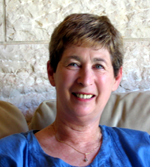By Dorothea Shefer-Vanson

MEVASSERET ZION, Israel — It came as something of a shock to me a few years ago to hear that there are some people who have mixed feelings about celebrating the Jewish festival known as Passover (Pesach). For someone like myself who quite likes eating matza this seems strange. But then I remember how things used to be.
In my childhood Pesach was always a time of excitement and renewal. Some time beforehand, my mother, my two younger sisters and I would undertake the long journey by underground from the London suburb where we lived into ‘town,’ i.e., Oxford Street, to buy new clothes for the festival. This invariably involved a lot of walking (Oxford Street itself is several miles long), gazing longingly into shop windows and eventually trying to find some garment (coat, dress) suitable in price, size and style to suit our various tastes. Sometimes this involved getting new shoes as well. All this must have represented a considerable financial burden for our parents, whose income was modest by any standard. But getting new clothes for the festival was considered essential.
Most important, at least for our parents, was the process of cleaning and preparing every nook and cranny of the house so that not a single speck of dust or crumb of food was left. Everything had to be pristine clean, so much so, in fact, that all our crockery and cooking utensils were packed up and put away so that different ones, which had themselves been packed up and put away at the end of the festival the previous year, could be brought out. As well as the interminable cleaning and scrubbing operations, this involved endless trips up and down the stairs to the attic where the Passover things were kept to bring them out and reinstall them. Equally, the everyday dishes and utensils had to be put away in the same fashion.
My poor parents had to work long into the night to achieve all this. No sooner was all this done, however, than in something akin to a logistical nightmare my mother had to embark on a marathon of cooking and baking in preparation for the impending Seder meal, the massive family dinner that involved providing all the ritual dishes that symbolized aspects of the Exodus story (bitter herbs to remind us of the bitterness of slavery, haroseth, a mixture of apples, wine and nuts commemorating the cement used to bind the bricks together, a hard-boiled egg to symbolize mourning and the circle of life, etc., etc.). Incidentally, any pictorial depiction of Jesus’ Last Supper, i.e., the Seder, in which bread features is by definition a historical travesty as Jesus was an observant Jew and would not have dreamed of eating leavened bread on that occasion.
To make matters worse, ever since the Jews were sent into exile by the Romans, the custom in the diaspora was to hold the Seder twice, as there was no way of knowing which was the correct Hebrew date. Nowadays we know, but the custom has become entrenched nonetheless. That is at least one good reason for moving to Israel, where there has always been only one Seder.
On the actual evening, once all the preparations are over and the ritual reading of the Haggadah, which recounts the sequence of events interspersed by prayers of devotion and praise for the miracle of the escape from bondage by the Children of Israel and even some rabbinical exegesis, all present partake of the traditional unleavened bread (matza) and the other ritual foods, followed by a sumptuous meal, which taxes everyone’s digestive system to the utmost and whose preparation has generally left the long-suffering housewife close to a state of exhaustion.
As devout and observant Jews, my parents and their parents before them did not question the necessity of adhering to every jot and tittle of the traditions and requirements. But I was born into a time when the existence of Israel as an independent Jewish state gives me the option of being Jewish without having to be observant and incurring the displeasure of the community. I feel that I am truly fortunate.
*
Shefer-Vanson is an author and freelance writer who may be contacted via dorothea.shefer@sdjewishworld.com. Comments intended for publication in the space below must be accompanied by the letter writer’s first and last name and by his/her city and state of residence (city and country for those outside the United States.)
I suppose if you feel that celebrating the holiday to it’s fullest is a burden, then you are justified in feeling “truly blessed.” I’m more concerned that the Jewish population’s existence is threatened as much by assimilation as it is from anti Semitism and terrorism than your “comfort from the supposed “displeasure” of those in the Jewish community who are both observant and love the traditions that have kept us a people.
–Ed Karesky, Escondido, California